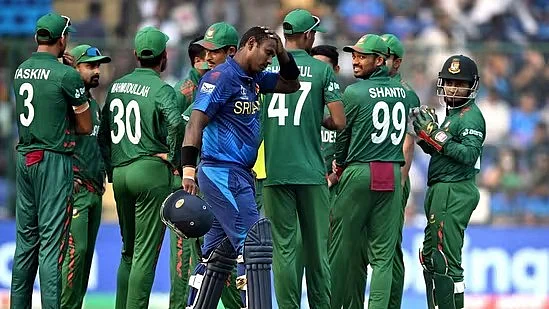Timed out: Shakib Al Hasan's idea of winning a war
Controversy erupts over former Sri Lanka captain’s historic dismissal after Bangladesh win

It was the first major controversy of the ICC World Cup on the pitch, that too coming in a game between two countries with no realistic chances of qualifying for the knockout stage. The debate over Angelo Mathews, the former Sri Lankan skipper, being the first ‘timed out’ dismissal in 146 years of international cricket – has kicked up a storm on social media overnight and will not go down in a hurry.
‘’It’s unfortunate (His dismissal), but within the rules,’’ said Bangladesh captain Shakib Al Hasan at the post-match press conference. While a majority of the former players-turned-TV pundits flayed Shakib for not backing out on his appeal against Mathews, barring a few exceptions like Sanjay Manjrekar, it still remains a moral question at the end of the day.
Before breaking it down to the fine print in the rulebook, let’s make it clear – there is no way this mode of dismissal can be treated at par with the ‘Mankading’ which Jos Buttler was subjected by Sri Lanka under Mathews’ captaincy during a 2014 ODI match. On that occasion, Lankan spinner Sachithra Senanayake removed the bails of Buttler who had backed too far forward and was out of the crease – not heeding to the bowler’s warning on a number of occasions.
‘’It was very disappointing. Ask Angelo,’’ England skipper Alastair Cook said on that occasion as Mathews refused to withdraw the appeal. Netizens were quick to point out on the Sri Lankan veteran’s past - the ICC has now legalised it on part of a bowler to run out a non-striker batter if he or she was out of the crease before the ball has been delivered.
The reason is simple: the batter in the above case is trying to get an unfair advantage of stealing a yard or two in terms of completing a single. How can that they be equated with the ‘Timed out’ and that too, when the batter concerned has had what his skipper Kushal Mendis referred to as an equipment malfunction?
Let’s take a look at ICC playing conditions on the Monday’s contentious issue: ‘’After the fall of a wicket or retirement of a batter, the incoming batter must, unless Time has been called, be ready to receive the next ball with 2 minutes of the dismissal or retirement. If this requirement is not met, the incoming batter will be out, Timed out.’’
The playing conditions for the World Cup supersedes the existing MCC laws of the game, which stipulates the time span between one dismissal and the next ball as three minutes. If Mathews’ post-match statement and his X-post well after Monday midnight is any indication – it betrays that the team was not up to speed with the two-minute rule.
A fuming Mathews said after the game: ‘’I have two minutes to get to the crease and get myself ready, which I did. And then it was an equipment malfunction. And I don't know where the common sense went because obviously it’s obviously disgraceful from Shakib and Bangladesh if they want to play cricket like that obviously stooped down to that level.
‘’I think there’s something wrong drastically because - if I got past my two minutes to get to the crease and the law says you have to be ready within the two minutes and I was there two minutes 45 or 50 seconds - I still had after my helmet broke off, I still had five more seconds to go. The umpires also have said to our coaches that they didn’t see my helmet breaking. I mean, I was just asking for my helmet.’’
Can an allowance be made to ensure the equipment failure? Adrian Holdstock, the fourth umpire, explained at the innings break: ‘’I think you need to make sure that you have all your equipment in place in order to make sure you get here because you actually have to ready to receive the ball within two minutes, not ready to prepare or take your guard. So technically, you should be there within may be 15 seconds to make sure all those things are in place before you actually receive the ball.’’
Now, there are times when ignorance of the rules or a brain fade in the middle, can lead to some amateurish mistakes – just recall the Jonny Bairstow dismissal during the second Test at the last Ashes, when he was out of the crease with the ball still alive and was stumped by wicketkeeper Alex Carey.
It’s accepted that the phrase ‘spirit of cricket’ is the biggest anachronism today. There are rules and then there are rules, but there must be some reason while no captain has taken recourse to this Timed Out rule in more than a century of international cricket – while there are six such recorded examples in first class cricket.
Shakib says he had a ‘war’ to win – but far greater wars in this game has been won without implementing this rule in history!
Follow us on: Facebook, Twitter, Google News, Instagram
Join our official telegram channel (@nationalherald) and stay updated with the latest headlines
